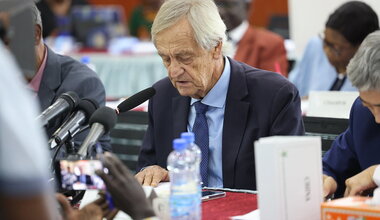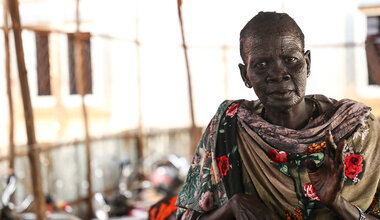Thousands of families flee rising waters in Fangak as extraordinary flooding hits South Sudan
Squatting on dirty plastic sheets on waterlogged ground and huddled together under ripped canvas tarpaulins strung together by sticks are thousands of families, forced to flee rapidly rising flood waters in Fangak.
“The water submerged our houses. With our families, we packed a few belongings and decided to relocate to Tonga in hope of better living conditions and support from the government of South Sudan and international organizations,” explains mother-of-five children, Marsa Nyijal Pajok.
She is among 15,000 people from Fangak County who have been displaced by extraordinary flooding. Around 3,600 have made their way to the neighbouring county of Tonga, in the Upper Nile region, and more continue to arrive each day. While some stay in the town, others have relocated to higher ground designated by local authorities. Their most urgent needs include medical care, protection services, shelter, and non-food items.
The United Nations Mission in South Sudan (UNMISS) and the UN Mine Action Service (UNMAS) led a patrol to Tonga to assess the dire situation. Joined by humanitarian partners and state authorities, they heard the concerns of those affected and are working to determine what support can be provided given limited funding and capacities.
“The water is encroaching the land where people are living, houses and schools are under water. We appreciate the generosity of the County Commissioner and of the host community for welcoming the civilians who came from Fangak County,” said the Minister of Peacebuilding, James Monyluak.
UNMISS and the delegation are also assessing the risk that tensions over scarce resources between those who have been displaced and the host communities could trigger conflict, causing even more harm to these already vulnerable families.
“Despite the difficult situation, people should strive for peaceful coexistence and unity,” says Paul Ebikwo, Acting Head of the UNMISS Field Office in Malakal. “We are supporting the government and humanitarian partners to find quick and efficient solutions to mitigate the effects of flood on population.”
So far, flooding has affected more than 710,000 people across 30 of South Sudan’s 78 counties and the Abyei Administrative Area, worsening an already critical humanitarian situation marked by severe food insecurity, economic decline, continued conflict, disease outbreaks and the repercussions of the Sudan conflict.
Jonglei, Unity and Warrap states have reported the highest numbers of affected locations and populations. Since May, floods have caused extensive damage to homes, crops and critical infrastructure, disrupting education and health services and increasing the risk of disease outbreaks.
 UN
UN United Nations Peacekeeping
United Nations Peacekeeping





